Milestones
23 June 2008UCT will celebrate its 180th anniversary next year. For eight of these years, from 2000 to 2008, Professor Njabulo S Ndebele served as the Vice-Chancellor and Principal, the eighth Vice-Chancellor in the university's illustrious history. Monday Paper looks at some of the highlights of his tenure.
2000 | 2001 | 2002 | 2003 | 2004 | 2005 | 2006 | 2007 | 2008
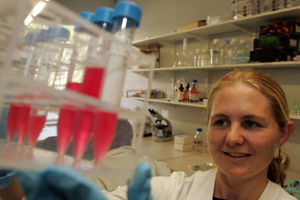 |
The VC embarks on a programme of wide consultation with people and constituencies within and outside the university, something he continues throughout his two terms. Student numbers exceed 17 000, 31% of them postgraduate students.
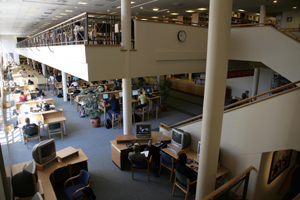 |
-
In the next months he launches his Vision 2001 and Beyond, his Ten Point Plan to grow UCT's global profile and consolidate UCT's research identity and position in the higher education sector, Five Action Guides and Seven Strategic Objectives.
-
He opens the R70-million Upper Campus Project and newly refurbished Chancellor Oppenheimer Library, this with more than one million volumes, including 16 700 print journal titles and over 29 000 electronic research resources.
-
The UCT Unilever Institute of Strategic Marketing is launched, based in the School of Management Studies and funded by the Unilever Foundation for Education and Development.
-
Two new MRC units are opened: the MRC/UCT Imaging Research Unit and the MRC/UCT Immunology of Infectious Diseases Research Unit.
-
The Centre for Actuarial Research and the Centre for Social Science Research are established in the Faculty of Commerce.
-
The GSB gains European Quality Improvement System accreditation, benchmarking the school against best international practice.
-
UCT revises and expands its approach to the impact of HIV/AIDS on the university community.
 |
The VC is elected to chair the South African Universities Vice-Chancellors' Association.
-
The Oliver Tambo Moot Court is established in the Kramer Law Building, opened by the late Dr Tambo's son, Dali Tambo.
-
The Institute for Infectious Diseases and Molecular Medicine is launched.
-
The Faculty of Health Sciences holds a special faculty assembly where a Faculty Declaration to recommit to transformation is adopted.
-
The Faculty of Engineering & the Built Environment's degrees are accredited by the Engineering Council of South Africa, the first such accreditation of similar programmes in South Africa.
-
Sales of the Schools Development Unit's Maths for All textbooks pass the one million mark.
-
The VC delivers the first Steve Biko Memorial Lecture in the Jameson Hall.
-
Acclaimed Nigerian playwright, political activist and Nobel Prize laureate, Wole Soyinka, delivers the TB Davie Lecture, commemorating academic freedom.
-
The VC is appointed chair of the board of the Institute for Democracy in South Africa.
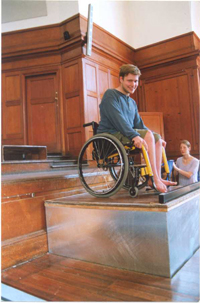
The Faculty of Health Sciences opens its new Learning Centre, housing five computer laboratories, 20 tutorial rooms and a state-of-theart lecture theatre.
-
The UCT Private Academic Hospital is launched, offering private healthcare and a learning platform for UCT medical students.
-
A new medical curriculum is launched, in line with UCT's endeavour to maintain world-class standards in health sciences education.
-
The Advanced Fuels Research Laboratory is launched in the Department of Mechanical Engineering, with R8 million from Sasol.
-
UCT establishes a chair in neuropsychology with Prof Mark Solms as the first incumbent.
-
A hoist is installed in the Jameson Hall to give wheelchair users full access to the stage during graduation ceremonies.
-
UCT renews its commitment to environmental sustainability by resigning the Tailloires Declaration, which underpins the UCT blueprint for sustainability, the Campus Green Plan.
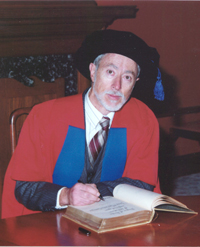
JM Coetzee, a UCT graduate and lecturer, receives the Nobel Prize for Literature.
-
UCT's first report on social responsiveness is produced.
-
National Orders are conferred on Dr Stuart Saunders, Emeritus Prof Peter Beighton, former staffer Hamilton Naki, and Nobel laureate, the late Prof Allan MacLeod Cormack.
-
The Department of Zoology celebrates its centenary.
-
UCT launches an MPhil in Disability Studies, creating a platform for debate between academia, the disability sector and policymakers.
-
The first Postgraduate Centre opens it doors, part of the VC's vision to support postgraduate students.
-
The Centre for Film and Media Studies is born, aiming to be at the forefront of film and media education in Africa.
-
The Commerce faculty's new Alumni Laboratory opens, with 202 top-of-the-range Pentiums 4s, using high-end software and a full, multi-media teaching laboratory.
-
Dr Ed Sturrock and a team from Bath University identify the first 3D crystal structure of the human angiotensin-converting ezyme, important to the creation of new drugs for high blood pressure.
-
The medical virology division opens two laboratories, including a biosafety level-three facility, allowing students to work with live virus cultures for the first time.
-
More than R1 million from De Beers, the Mellon Foundation and the Scan Shop underpins the digitisation of the valuable Bleek Lloyd Collection, a web-based resource to capture the lost language, customs and mythology of the / Xam people.
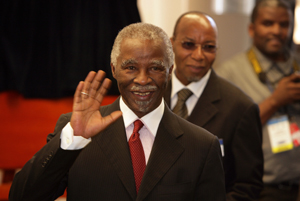 |
UCT celebrates its 175th anniversary. The theme Changing Minds and Histories is chosen for the year-long commemoration.
-
President Thabo Mbeki receives the UCT Chancellor's Award for Outstanding Leadership in Africa.
-
The Raymond Ackerman Academy for Entrepreneurial Development opens in the GSB, underwritten by alumnus Raymond Ackerman.
-
Emer Dist Prof George Ellis wins the R10-million Templeton Prize for his work on the interface between science and religion.
-
UCT honours the late activist Molly Blackburn by renaming the hall in the Otto Beit Building the Molly Blackburn Memorial Hall.
-
Phandle Phandle is the first blind vice-president of the Student Representative Council
-
The UCT Employment Equity plan is approved by Council.
-
The establishment of interdisciplinary research focus areas, UCT Signature Themes, is endorsed by the University Research Committee. This paves the way for flagship programmes such as the South African Research Chairs Initiative and the National Research Foundation's research niche areas.
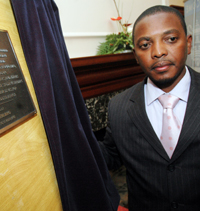
Steve Biko's son, Nkosinathi, opens the Steve Biko Student Union Building, the new name for the building housing the Student Development and Services Department.
-
UCT's MBA is rated second in the world in the "value for money" in the FT's Global MBA Top 100 survey.
-
UCT is one of three universities to get grants of R12.4 million each from the Carnegie Corporation of New York to fund further transformation among academic staff
-
UCT hosts the 11th General Conference of the Association of African Universities.
-
The VC launches the Heritage Trail, a self-guided trail of 18 historical sites on campus.
-
Six UCT researchers are among the first to receive awards from the Department of Science and Technology's Patent Incentive Fund.
-
The Living Transformation Plan is launched to deepen transformation at UCT.
-
The Disabled Bus, part of the Jammie Shuttle fleet, is introduced, designed to provide transport for disabled staff and students.
-
The VC is elected president of the board of the Association of African Universities, to the end of 2009.
-
The UCT HIV/AIDS Unit is relocated to the Office of the Vice-Chancellor and renamed HIV/AIDS Co-ordination-UCT (HAICU), facilitating improved, campus-wide co-ordination.
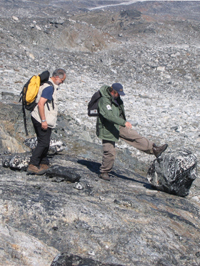
UCT's Little Theatre celebrates its 75th anniversary.
-
UCT resource unit DataFirst is selected by the World Bank to house its entire collection of Investment Climate Survey data. The database covers 52 emerging countries.
-
The atrium in the Hoerikwaggo building, home to the Centre for Higher Education Development, is named the ZK Matthews Gallery, honouring intellectual activist and struggle icon Zachariah Keodirelang Matthews.
-
The VC is awarded an honorary doctorate at University College London.
-
UCT's International Academics Programmes Office celebrates its 10th anniversary.
-
UCT wins the Excellence in Corporate Governance Award for higher education institutions at the PriceWaterhouseCoopers 2006 Higher Education Conference.
-
The Student Representative Council celebrates its centenary.
-
The MA-RE Institute for marine research is launched, highlighting one of the university's Signature Themes.
-
Earth AEON is launched, a joint initiative of South African scientists to develop, research and teach earth systems science.
-
The first Khuluma institutional climate intervention programme is held. To date more than 600 staff have attended the programme.
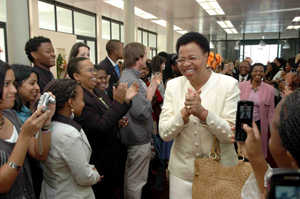 |
The UCT Council announces the appointment of Dr Max Price as Vice-Chancellor designate.
-
Prof Francis Petersen is the new Dean of Engineering & the Built Environment, succeeding Prof Cyril O'Connor.
-
President Thabo Mbeki opens the third component of the International Centre for Genetic Engineering and Biotechnology, based in UCT's Faculty of Health Sciences.
-
The Centre for High Performance Computing is launched, a collaboration between the Department of Science and Technology, UCT and the Meraka Institute of the Council for Scientific and Industrial
 |
UCT's Department of Human Biology launches its Advanced Microscope Imaging Facility.
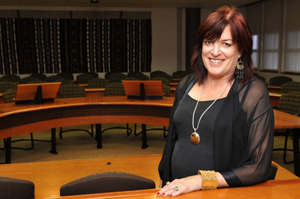 |
-
Professor of Respiratory Medicine, Eric Bateman, is appointed chair of the Global Initiative for Asthma.
-
The December 2007 edition of Time magazine lists the Hofmeyr skull finding among its top 10 scientific discoveries of the year. UCT's Prof Alan Morris (anatomy) is among the team.
-
UCT is among prominent institutions that signed the Cape Town Open Education Declaration that promotes open resources, technology and teaching practices.
-
Acclaimed linguist Prof Neville Alexander wins the prestigious Linguapax Award.
-
The Carnegie Corporation of New York awards a three-year R15.5 million grant to further institutional transformation and employment equity at UCT.
-
The draft policy on sexual harassment is approved by Council. The reforms, though not new, bring UCT in line with national policies.
-
Drucilla Cornell, a research professor of private law, is UCT's first woman to receive an A-rating from the National Research Foundation.
-
Prof Vanessa Burch becomes the first woman to hold an established chair in the Department of Medicine, succeeding Prof Solly Benatar.
-
UCT launches the Volvo Research & Educational Foundations Centre of Excellence for Future Urban Transport to tackle African urban transport issues.
 This work is licensed under a Creative Commons Attribution-NoDerivatives 4.0 International License.
This work is licensed under a Creative Commons Attribution-NoDerivatives 4.0 International License.
Please view the republishing articles page for more information.






